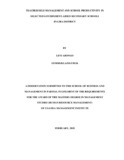| dc.contributor.author | ABONGO, LEVI | |
| dc.date.accessioned | 2019-09-03T14:10:37Z | |
| dc.date.available | 2019-09-03T14:10:37Z | |
| dc.date.issued | 2018-02 | |
| dc.identifier.citation | Abong, Levi (2018) Teacher self- Management and school productivity in selected Government- Aided Secondary schools in Lira District | en_US |
| dc.identifier.uri | https://hdl.handle.net/20.500.12305/479 | |
| dc.description.abstract | This study was on teacher-self management and school productivity. The purpose of the study was to assess the relationship between teacher self-management and school productivity in selected Government aided secondary schools in Lira district. The objectives of the study included them following; To examine the relationship between cognitive, affective and psychomotor domains as well as the environment around the teacher and school productivity in selected Government-aided secondary schools in Lira District. The research employed a cross sectional design and employed both quantitative and qualitative data collection approaches. Data collection tools included questionnaires and interview guide and documentary review guide. A sample size of 123 respondents was selected using purposive and simple random sampling techniques, out of whom 92 respondents actually participated in the study. Thematic analysis was employed to analyze qualitative data whereas SPSS software package was used in the analysis of quantitative data using Pearson correlation and regression analyses. Research findings indicated that environment around the teacher has the strongest influence on school work productivity (r = 0.723**). Psychomotor domain has a strong positive relationship with school productivity(r = 0.726**), cognitive domain had a strong positive relationship with school work productivity(r = 0.629**) and affective domain also had a strong positive relationship with school productivity (r = 0.560**). The researcher concluded that environment around the teacher greatly contributes to school productivity. The study further concludes that cognitive, affective and psychomotor domains significantly influence school productivity. The researcher recommended that teachers should always make an assessment of the teaching materials. Government should construct more classroom blocks for the secondary schools to ensure that they have enough sitting/ teaching space. Further study may be carried out on the effect of rewards on teachers’ performance in government aided secondary schools. | en_US |
| dc.language.iso | en | en_US |
| dc.publisher | Uganda Management Institute | en_US |
| dc.subject | Teacher Self - Management | en_US |
| dc.subject | School Productivity | en_US |
| dc.subject | Government- Aided Secondary schools | en_US |
| dc.title | TEACHER SELF-MANAGEMENT AND SCHOOL PRODUCTIVITY IN SELECTED GOVERNMENT-AIDED SECONDARY SCHOOLS IN LIRA DISTRICT | en_US |
| dc.type | Thesis | en_US |

